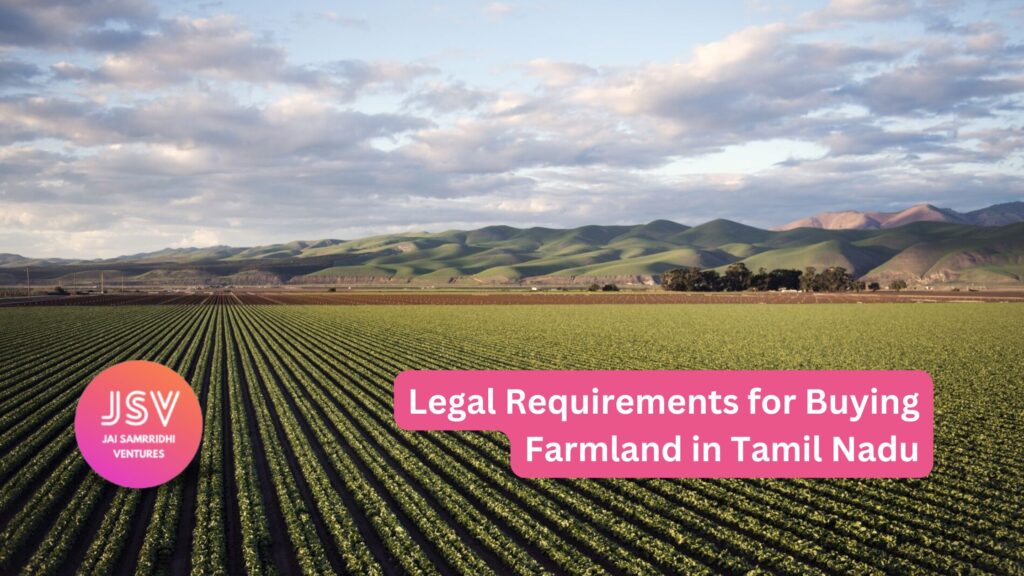A Complete Guide : Buy Agricultural Land in Tamil Nadu

To buy agricultural land in Tamil Nadu, it’s essential to understand the land laws governing agriculture in India. Non-resident Indians (NRI) are generally not allowed to buy agricultural land unless they obtain special permission under the Foreign Exchange Management Act (FEMA). For those looking to invest in agricultural land,
it is advisable to research land parcels available for farm use and ensure compliance with land acquisition regulations. You may consider contacting local real estate agents or visiting government websites to find land for sale that meets your requirements.
When you decide to purchase agricultural land, ensure that you review the tax receipts and verify the land ownership records to avoid any disputes. For funding the purchase, you can approach banks like the Bank of India for loans tailored for agricultural purposes.
Keep in mind the capital gains tax implications when you eventually sell agricultural land, as this could affect your overall investment returns. If your background is in agriculture, leveraging your knowledge can help you make informed decisions about the acres of irrigated land you intend to purchase.
Steps to Buy Farmland in Chennai
Buying agricultural land in India, particularly in Chennai, involves several crucial steps for both residents and non-resident Indians (NRIs). First, it’s essential to understand the land laws governing land acquisition for agricultural purposes.
NRIs can buy agricultural land in India, but they must comply with the Foreign Exchange Management Act (FEMA) and seek special permission from the Reserve Bank of India (RBI) if required. It’s advisable to thoroughly research available land parcels or land for sale that suit agricultural use.
Once you have identified a suitable agricultural plot, the next step is to verify the land ownership and ensure that there are no disputes. Obtaining tax receipts and checking for any land ceiling restrictions is crucial. If the land for agricultural use is free from legal encumbrances, you can proceed with the purchase of agricultural land. Engaging a local lawyer experienced in land purchase can help navigate this process. Additionally, if you plan to invest in agricultural land, consider the potential for capital gains tax upon selling.
Finally, ensure that the change of land use complies with local regulations, especially if you intend to purchase agricultural land in India for non-agricultural purposes in the future. For NRIs, the process may involve transferring funds through the Bank of India or other authorized channels. With careful planning and due diligence, acquiring farmland in Chennai can be a rewarding investment.

Mistakes to Avoid When Buying Agricultural Land
When looking to purchase agricultural land, especially in places like Karnataka, there are several critical mistakes to avoid. First, ensure that you have a clear understanding of the land title. Many buyers overlook this, which can lead to complications if the piece of agricultural land is under someone else’s name or has disputed ownership.
It’s essential to verify the title through the commissioner of the land revenue. Additionally, if you are an NRI, be aware that while NRIs can invest in agri land, there are specific regulations that dictate that NRIs can purchase only under certain conditions set by the land Reform Act.
Furthermore, consider the agricultural background of the plot. If the land is located in a rural area, it may be suitable for agricultural land for farming, but if it is undergoing land conversion to non-agricultural land, this could impact your investment. Another common mistake is not evaluating land prices in the area.
The value of owning agricultural land can fluctuate, and understanding the market will help you avoid overspending on a plot of land. Ultimately, anyone can buy agricultural land, but doing thorough research is essential to make an informed decision.
Can I Buy Agricultural Land in Tamil Nadu?
In Tamil Nadu, the regulations surrounding the purchase of agricultural land can be quite specific. Generally, individuals who are not farmers or do not hold a valid agricultural background cannot buy agricultural land in the state.
However, there are exceptions for persons of Indian origin, who might be permitted to buy land for agricultural purposes under certain conditions. Moreover, NRIs looking to invest in the agricultural sector can find opportunities for NRIs in rural areas, especially on fertile agricultural plots that are conducive to farming.
It is important to note that agricultural land involves specific land usage regulations, which may vary across different Indian states. The land revenue department oversees these regulations, and any attempt to convert agricultural land into residential use requires approval.
While some may wish to develop farmhouses in India on such lands, transitioning land into residential areas can be a complex process. Ultimately, understanding the regulations and seeking appropriate permissions is key to successfully navigating land purchases in Tamil Nadu.
Is it Safe to Buy Agricultural Land?
Buying agricultural land can be a promising investment, especially for those wishing to purchase agricultural land in rural areas. Agricultural land can provide numerous benefits, including opportunities for agricultural activities and access to agricultural resources.
In India, individuals looking to purchase land must be aware of the regulations governing land ownership, as certain agricultural land is exempt from restrictions that apply to urban land. This means that nris are permitted to invest in agricultural land, allowing them to engage in agricultural development and contribute to the local economy.
However, potential buyers should conduct thorough research before making a decision. It is essential to understand the land value and the specific regulations that might affect the agricultural landscape in the area.
For instance, those who inherit agricultural land may face different challenges compared to those who purchase agricultural land outright. Additionally, as nris can explore opportunities anywhere in India, they must ensure that the planned agricultural activities align with local agricultural practices and market demand. Ultimately, careful consideration can lead to successful investments in the agricultural sector.

Can I Build a Farmhouse on Agricultural Land in Tamil Nadu?
Building a farmhouse on agriculture land in Tamil Nadu involves several legal and regulatory considerations. In general, one can purchase agriculture land for various uses, but the primary purpose should align with agricultural practices.
If you plan to construct a farmhouse, it is essential to ensure that the land is designated for rural agricultural use. The Tamil Nadu government has specific regulations that govern how agricultural plots can be utilized, and any deviation from agricultural use can attract penalties.
To proceed with your plans, it is crucial to understand that those who purchase agricultural land must obtain the necessary approvals from local authorities. This often includes obtaining a conversion certificate if the intention is to develop the land for non-agricultural purposes, such as a farmhouse.
Engaging in real estate development on agricultural land may require adherence to zoning laws and compliance with environmental regulations. Therefore, if you are considering building a residential structure on agriculture land, it is advisable to consult with legal experts and local government offices to navigate the complexities involved.
Factors to Consider When Buying Farmland
When considering the purchase of farmland, there are several crucial factors to evaluate to ensure a successful investment. One of the primary considerations is the residential zoning regulations in the area. Understanding how land can be utilized, including potential for future development, is vital. Some buyers may wish to combine agricultural activities with residential living, and knowing the local zoning laws will help determine what is permissible.
Another important aspect is the quality of the soil. The fertility and composition of the land will significantly impact the types of crops that can be grown and the overall productivity of the farm. Conducting soil tests can provide valuable insight into nutrient levels and any necessary amendments needed to optimize crop yields.
Furthermore, water availability is a critical factor to consider. Access to irrigation sources, such as rivers or lakes, can vastly improve agricultural operations. Assessing the local climate and rainfall patterns also plays a role in determining the viability of farming activities on the land.
Lastly, proximity to markets should not be overlooked. Being near urban centers can facilitate the sale of produce and other farm products, making the venture more profitable. Overall, thorough research and understanding of these factors will lead to a more informed decision when buying farmland.

Legal Requirements for Buying Farmland in Tamil Nadu
Buying farmland in Tamil Nadu involves several legal requirements that potential buyers must consider. First and foremost, it is essential to verify the land’s title deed and ensure that the seller has the rightful ownership.
Buyers should also check for any encumbrances, such as loans or disputes, that may affect the transaction. Additionally, the residential status of the land is crucial; some areas may have restrictions on converting agricultural land for residential purposes. Buyers should be aware of the Tamil Nadu Land Reforms Act, which imposes limits on land ownership to prevent excessive accumulation of agricultural land by a single entity.
Moreover, obtaining the necessary approvals from local authorities is imperative for a smooth transaction. This includes registering the sale deed with the sub-registrar and paying the applicable stamp duty.
Buyers must also ensure compliance with the Agricultural Produce Market Committee (APMC) regulations if they plan to engage in agricultural activities. It is advisable to consult a legal expert familiar with Tamil Nadu’s land laws to navigate these requirements effectively and avoid potential legal issues in the future.

